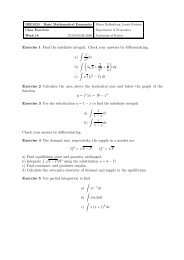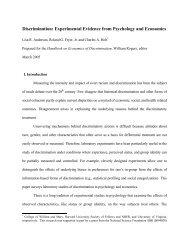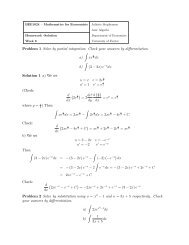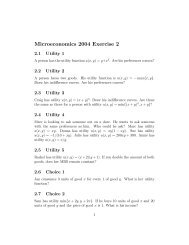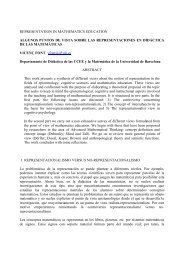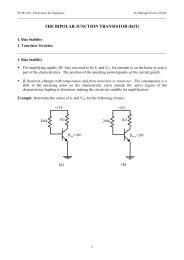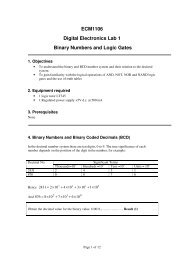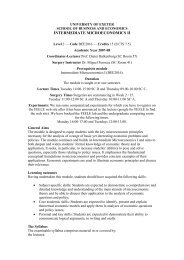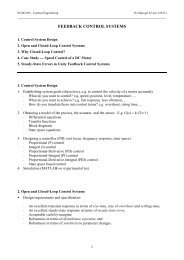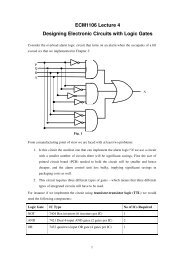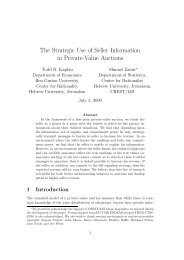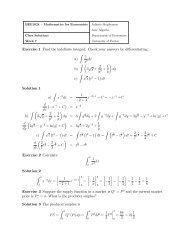1 Introduction<strong>Social</strong> identity is commonly defined as a person’s sense of self derived from perceived membershipin social groups. When we belong to a group, we are likely to derive our sense of identity, at least inpart, from that group. While st<strong>and</strong>ard economic analysis focuses on individual-level incentives indecision-making, group identity has been shown to be a central concept in underst<strong>and</strong>ing phenomenain social psychology, sociology, anthropology <strong>and</strong> political science. It is used to explain suchphenomena as ethnic <strong>and</strong> racial conflicts, discrimination, political campaigns (McDermott 2004),<strong>and</strong> education (Coleman 1961).<strong>Social</strong> identity theory was developed by Tajfel <strong>and</strong> Turner (1979) to underst<strong>and</strong> the psychologicalbasis for intergroup discrimination. According to this theory, social identity has three majorcomponents: categorization, identification <strong>and</strong> comparison. The first component, categorization,is the process of putting people, including ourselves, into categories. Labelling someone as a Muslim,a female, or a soldier are ways of defining these people. Similarly, our self-image is associatedwith what categories we belong to. <strong>Social</strong> psychology experiments show that people quickly <strong>and</strong>easily put themselves <strong>and</strong> others into basic categories. The second component, identification, isthe process by which we associate ourselves with certain groups. Ingroups are groups we identifywith, <strong>and</strong> outgroups are ones that we don’t identify with. The third component, comparison, is theprocess by which we compare our groups with other groups, creating a favorable bias toward thegroup to which we belong.One insight from social identity theory is that the groups to which people belong mean somethingto them. Once a person sees herself as part of a group, she derives self-esteem from that groupmembership (McDermott 2004). To explore this concept, Shih, Pittinsky <strong>and</strong> Ambady (1999) studysocial identity <strong>and</strong> stereotype susceptibility with a group of Asian-American female undergraduatesgiven a math test under three conditions. A third of the students completed a questionnairefocused on their female identity before taking the test. Another third completed a pre-test questionnairethat focused on their Asian identity. The control group filled out a gender- <strong>and</strong> ethnicityneutralquestionnaire. Results show that, relative to controls, participants earned the highest testscores when the questionnaire emphasized their Asian identity <strong>and</strong> the lowest when it emphasizedtheir female identity. Shih et al. (1999) conclude that the questionnaire, which makes one of theirmultidimensional social identities salient, changed the women’s performance according to powerfulstereotypes associated with each identity, i.e., Asians possess excellent quantitative skills <strong>and</strong>women do not.As group identity affects individual behavior, many experiments in social psychology assesswhether <strong>and</strong> to what extent people interact with ingroup <strong>and</strong> outgroup members differently. Theseexperiments confirm Tajfel’s finding that group membership creates ingroup enhancement in waysthat favor the ingroup at the expense of the outgroup. Many of these experiments use the minimalgroup paradigm. In a typical minimal group experiment, subjects are r<strong>and</strong>omly assigned to groups,which are intended to be as meaningless as possible. The subjects then assign points to anonymousmembers of both their own group <strong>and</strong> the other group. In these studies, subjects tend to award morepoints to people who are identified as ingroup members. Experiments involving ratings of ingroup<strong>and</strong> outgroup members have found that participants tend to rate ingroup members higher thanoutgroup members.The systematic introduction of identity into economic analysis starts with Akerlof <strong>and</strong> Kranton(2000). In their study, they propose a neoclassical utility function, where identity is associatedwith different social categories <strong>and</strong> expected respective behaviors, i.e., a prescription or norm for2
ehavior. Deviations from the prescription cause disutility. They apply this model to differentanalyses of gender discrimination, the economics of poverty <strong>and</strong> social exclusion, the householddivision of labor (Akerlof <strong>and</strong> Kranton 2000), the economics of education (Akerlof <strong>and</strong> Kranton2002) <strong>and</strong> contract theory (Akerlof <strong>and</strong> Kranton 2005).To underst<strong>and</strong> the role of social identity in determining behaviors such as reciprocity, distribution<strong>and</strong> social-welfare-maximizing actions, it is crucial to systematically measure the effect ofidentity on social preferences.In this paper, we use laboratory experiments to measure the effects of group identity on participantsocial preferences. Like classical social psychology experiments (Tajfel, Billig, Bundy <strong>and</strong>Flament 1971), we induce group identity using participant painting preferences. However, unlikesocial psychology experiments, which focus on allocation between other participants, we use amuch wider class of games to systematically measure the effects of identity on various aspects ofsocial preferences, such as distribution <strong>and</strong> reciprocity preferences. Although ingroup favoritism<strong>and</strong> outgroup discrimination has been a very robust finding in the social psychology literature, littleis known about how it is sustained when there is a conflict with self-interest. We choose a sampleof simple games from Charness <strong>and</strong> Rabin (2002), incorporate social identity into the socialpreference model, <strong>and</strong> estimate its effects on social preferences.Specifically, we are interested in several questions. First, are participants more differenceaverse toward ingroup members than outgroup members? If so, to what extent? Second, areparticipants more likely to reciprocate positively towards ingroup members? In other words, arethey more likely to forgive or to punish perceived bad intentions of ingroup members? Third,are they more likely to choose social-welfare-maximizing actions when matched with an ingroupmember compared to when matched with an outgroup member?In this study, we find that participants matched with an ingroup member show more charitywhen their payoffs are higher, <strong>and</strong> less envy when they are behind in earnings. Furthermore, wefind that the likelihood to reciprocate another’s good intention or to retaliate against another’s badbehavior depends negatively on the cost of doing so. Other things equal, participants are morelikely to reciprocate positively to ingroup than to outgroup members. They are more forgivingtowards bad behaviors from ingroup matches compared to outgroup matches. Furthermore, participantsare significantly more likely to choose social-welfare-maximizing (hereafter shortened asSWM) actions when matched with an ingroup member. As a result, expected earnings are significantlyhigher when participants are matched with an ingroup rather than an outgroup member.This paper is organized as follows. Section 2 reviews the experimental economics literatureon social identity. Section 3 presents the experimental design. Section 4 presents the model <strong>and</strong>hypotheses. Section 5 presents the analysis <strong>and</strong> main results. Section 6 concludes.2 Economic Experiments on <strong>Social</strong> <strong>Identity</strong>There have been a number of economic experiments on group identity, using either natural orinduced identities.In economic experiments that incorporate natural identities, gender <strong>and</strong> ethnicity in particular,the results are mixed. On the one h<strong>and</strong>, Brown-Kruse <strong>and</strong> Hummels (1993) <strong>and</strong> Cadsby <strong>and</strong>Maynes (1998) use a pre-game questionnaire to create a sense of membership in a group <strong>and</strong> findthat gender does not have a significant effect on participant contributions in a VCM public goodsexperiment. However, on the other h<strong>and</strong>, Solow <strong>and</strong> Kirkwood (2002) <strong>and</strong> Croson, Marks <strong>and</strong>3
- Page 1: Group Identity and Social Preferenc
- Page 5 and 6: identity strength on cooperative be
- Page 7 and 8: In our study, the stage of other-ot
- Page 9 and 10: while ρ(1 + a) measures the charit
- Page 11 and 12: Support. In Table 2, column 5 prese
- Page 13 and 14: when A is an outgroup match. When A
- Page 15 and 16: compared to outgroup matching, incr
- Page 17 and 18: By Result 5, we reject Hypothesis 6
- Page 19 and 20: induced identity, when matched with
- Page 21 and 22: APPENDIX A. Sequential Games with S
- Page 23 and 24: Based on your choices, you prefer t
- Page 25 and 26: [New Screen]Please record your deci
- Page 27 and 28: [New Screen, Game 1, Player A]In th
- Page 29 and 30: [New Screen, Game 3, Player B]In th
- Page 31 and 32: Appendix C. Post-Experiment Survey(
- Page 33 and 34: Session # Treatment or Control Game
- Page 35 and 36: Dependent Variables Prob(B rewards
- Page 37 and 38: Dependent Variable:Prob(B Choosing
- Page 39 and 40: Tokens3503002502001501005000 1 2 3
- Page 41 and 42: ReferencesAkerlof, George and Rache



